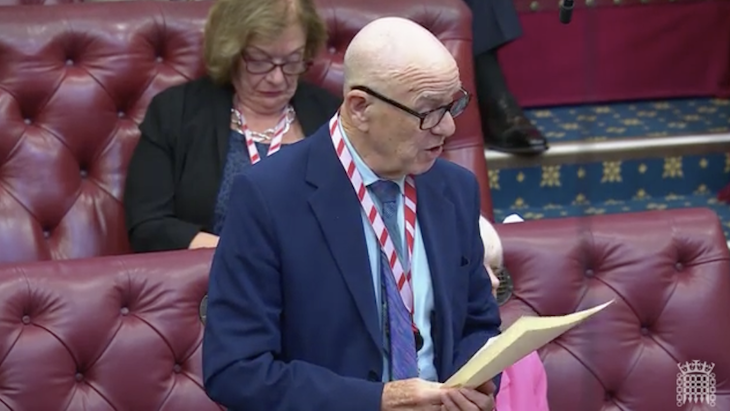We’re back again in the House of Peers this week as they once again give a leaden beating to Leadbeater’s suicide bill. Even when discussing matters of life and death, there is something very reminiscent of Gilbert and Sullivan about the place. The most famous G&S operetta set in the House of Lords is, of course, Iolanthe – when Parliament is taken over by a group of incompetent fairies. I’m saying nothing.
Falconer slumped there, a face like a constipated toad throughout
Again, the House was full. Perhaps aware that some of the most convincing criticism of the bill both in the Commons and Lords had come from women, today its sponsor Lord Falconer had surrounded himself with a rotating cast of female Fabian prunes for moral support. He slumped there, a face like a constipated toad throughout, the Blairite Hugh Hefner and his Lethal Injection Bunnies.
A number of Falconer’s posse engaged in pure Gilbertian topsy-turvydom, specifically trying to chastise their Lordships for using the word ‘suicide’ in a debate that involves amending the Suicide Act. Baronesses Thornton and Blackstone both did battle with reality and plain English. Baroness Royall – who, along with Mandy was recently rejected by Oxford as a candidate to be their Chancellor – gave their Lordships a particularly incoherent haranguing on this topic.
Lord Brooke of Alverthorpe delivered a truly bonkers speech in which he appeared to suggest that assisted dying, as a tool of population control, might contribute to the fight against climate change. He heaped praise on abortion and (I am not making this up) even homosexuals for their efforts at keeping the population down. If he’d been given a few minutes longer, I suspect we might have heard paeans to mosquitoes and the Black Death. This was without doubt one of the most surreal speeches I have ever heard in my years covering Parliament; Thomas Malthus meets Greta Thunberg with a soupcon of Logan’s Run. It made Jonathan Swift’s modest proposal sound like a day at the Wacky Warehouse.
There were, however, some absolutely magnificent salvos from the peers. Baroness Butler-Sloss, still formidable at 92, completely dismantled the fantasy of the proposed Death Panels as a safeguard with a series of barked questions: ‘Will they meet in public? Will they meet at all? Why no Coroner?’
There was a good bit of Latin from the Bishop of Chichester, this debate he said, was full of ‘lacrimae rerum’, the things of which tears are made. He also reminded the House that contra the arguments of the lobbyists for the bill, sanctity of life was not some monstrous conspiratorial Christian imposition but the basic assumption that underpins all of our law. There was a gloriously vinegary speech by Lord Moylan about the ridiculous euphemisms the bill contains; ‘approved substances’ to be administered by an ‘approved device’, suicide as ‘assistance’. Gilbert would be proud of such preposterous wordplay.
The debate saw considerable pushback against the bill’s sponsor; Lord Wolfson of Tredegar politely but firmly took Lord Falconer to task for dismissing views informed by religious faith, and rubbished suggestions that peers should “uncritically defer” to the Commons. Rather awkwardly, Lord Falconer was forced to begin his statement with an apology for failing to disclose that the lobby group Dignity in Dying had funded the printing of literature sent to peers.
Baroness Fox of Buckley warned that there would inevitably be legal demands to expand the law; “God help us once human rights lawyers get involved”. Meanwhile Lord Frost offered a philosophical critique of the bill, reminding peers that it essentially enshrined utilitarianism as the guiding ethical principle for the law, and that this would lead to very dark places indeed.
In such moments the superior nature of the Upper House’s debate shone through. Many of the current House of Commons couldn’t even pronounce Utilitarianism, let alone critique it philosophically. As Gilbert wrote in Iolanthe, ‘with a House of Peers composed of persons of intelligence, what is to become of the House of Commons?’ We are already seeing the answer to that; a dumping ground for Student Union politicians, toadies and people who shouldn’t be allowed to use cutlery unsupervised. Some, indeed, fall into all three categories.
Throughout it all, the Grim Leadreaper herself sat in the viewing gallery, making grimaces when peers disagreed with her and looking over to one of her bag carriers for sympathy when the bill got yet another slamming by someone who has probably forgotten more on the salient topics than she ever knew.
WS Gilbert also wrote at the end of the Pirates of Penzance, ‘no Englishman unmoved that statement hears, because with all their faults we love our House of Peers’. It was a line which might well have come to more than one mind listening to the debate today.








Comments